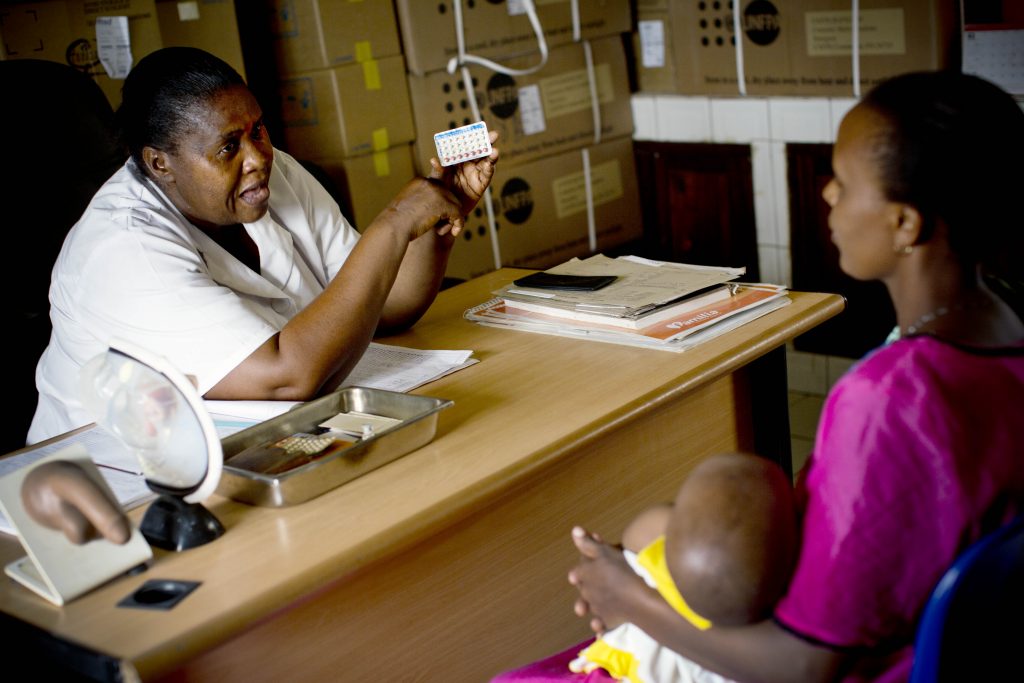Three Common Contraceptives Have No Substantial Effect on HIV Risk

A landmark clinical trial in eastern and southern Africa shows no substantial difference in the risk for acquiring HIV among women using any of three common methods of contraception included in the study.
That’s the good news.
However, data from the Evidence for Contraceptive Options and HIV Outcomes (ECHO) study, published June 13 in The Lancet, also reveal an unacceptably high incidence of HIV infection among women who participated in the trial, Jhpiego experts say.
“The study results are particularly reassuring for women and girls at high risk for HIV acquisition, many of whom live in countries served by Jhpiego programs in family planning, HIV, and maternal and newborn health,” says Dr. Leslie Mancuso, Jhpiego’s President and CEO. “This evidence is critical for Jhpiego staff and health providers who care for millions of women and girls at risk for HIV who depend on or are planning to use contraception. It also compels us to find more robust ways to engage women and girls in their own health.”
The World Health Organization (WHO) plans to issue guidance in late July on the medical eligibility criteria for the contraceptive methods used in the study: injectable depot medroxyprogesterone acetate intramuscular (DMPA-IM), a levonorgestrel implant and a copper IUD. Jhpiego will work closely with in-country partners to incorporate updated guidelines into practice for frontline health care providers, most of whom are nurses and midwives.
“While ECHO has answered important questions about risk of HIV acquisition among women seeking effective contraception, a great deal of work remains to be done to ensure all women and girls receive better integrated family planning, HIV prevention and maternal health services,” says Dr. Lisa Noguchi, Jhpiego’s Director of Maternal and Newborn Health. Noguchi’s commentary about ECHO also appears today in The Lancet.
Jhpiego-led programs that provide HIV prevention and family planning services, including the Sauti Project in Tanzania and the TSEPO [Technical Support to Enhance HIV/AIDS Prevention and Opportunities in Nursing Education] Project in Lesotho, welcomed news of the ECHO results, but lament the high rate of new HIV infections among participants in the study, says Kelly Curran, Jhpiego’s Senior Director for HIV and Infectious Diseases.
Curran points out that overall HIV incidence in ECHO was nearly 4% per year—despite the fact that participants received extensive HIV prevention counseling. This percentage might sound low but it’s 4% per year, Curran says, adding, “If 100 girls are HIV negative at age 15, but 4% of them acquire HIV each year, you can see how prevalence in these settings becomes sky high by age 30. The WHO considers any population with estimated incidence over 3% to be eligible for oral PrEP [pre-exposure prophylaxis], which means that these general population family planning users in high prevalence settings are in the same ‘high risk’ incidence category as sex workers and men who have sex with men.
“This demonstrates that many women in southern and eastern Africa remain at risk and need access to evidence-based HIV prevention strategies, including oral PrEP.”
The ECHO Study randomly assigned HIV-negative women from the Kingdom of Eswatini, Kenya, South Africa and Zambia to use one of the three contraceptive methods. Women received counseling on family planning and HIV prevention and referral for oral PrEP, where available. A key impetus for the trial was ongoing uncertainty about whether DMPA-IM increased women’s risk of getting HIV, a concern that has been ongoing for several decades.
Importantly, the results of ECHO confirmed that the three methods—all used in countries where Jhpiego works—are safe and effective for preventing pregnancy.
Jhpiego, a Johns Hopkins University affiliate, is a nonprofit global leader in the creation and delivery of transformative health care solutions that save lives in over 40 countries. In promoting high-quality care for clients and families, we are committed to translating evidence into practice to help women and girls make informed decisions about their care, including HIV prevention, family planning, and maternal and newborn health.



